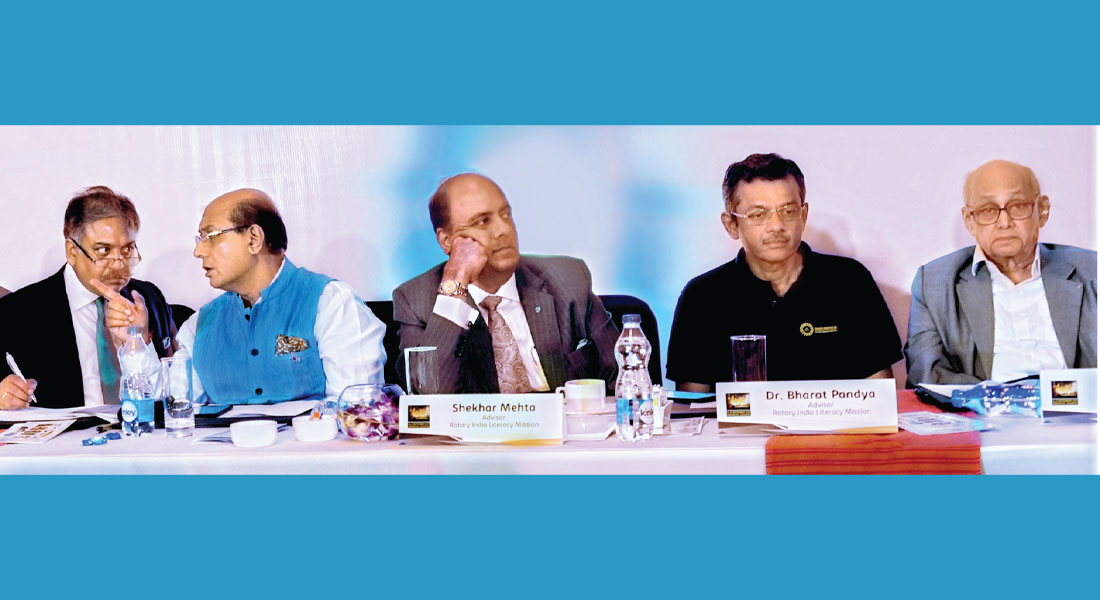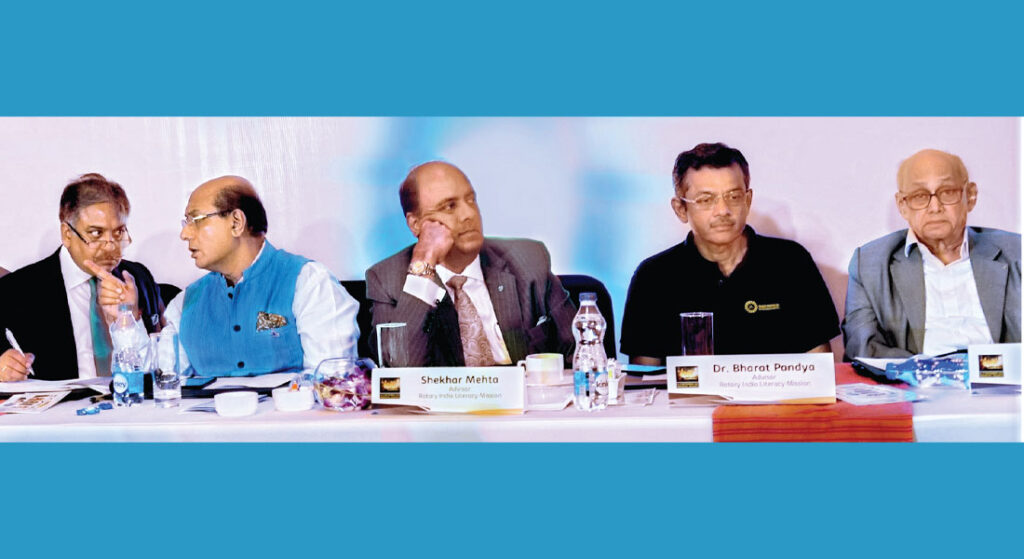
Way back in 2010–11 when we in Rotary first dreamt of making India literate, I had said it is probably the most important thing we Rotarians can do for our country,” said PRIP and RILM Chair Kalyan Banerjee at the Ignite session in Kolkata.
And towards this goal, he chose RIPN Shekhar Mehta for this cause because “having known him since 1995, long before he became a district governor, I knew that if you had a job to be done — give it to a crazy fanatic like Shekhar. And he will never stop till the work is complete, and done perfectly too.”
By 2014 he had come up with the concept of TEACH — Teacher support, E-learning, Adult literacy, Child development and Happy school. This was an “amazing and comprehensive” project because it included all the core components of education. While other NGOs working in this area had picked up one or two of these thrust areas, Rotary was ready to do all of them.
“The team that the Rotary India Literacy Mission (RILM) gathered was special, dedicated and committed and Rotarians pitched in everywhere. Things fell into place, he gathered a core group to manage the correspondence, the queries, and then they selected a brilliant, enthusiastic, committed group of Rotarians.”

These people were passionate about making the country literate and the juggernaut moved on. With or without the resources provided through RILM, the clubs moved on, often raising funds on their own “because they loved literacy and wanted their community to be literate. At the same time, holding hands with RILM and the Rotary clubs, the Government of India and all other literacy-oriented NGOs got involved,” said Banerjee. Urging the assembled governors and other senior leaders, most of them PDGs, on various committees, RIPN Shekhar Mehta said the goal was to make India totally literate by 2025. “And to do that we have to replicate what we did with polio. If polio was a dream that was large, then making India literate is larger than the largest dream. It is very complicated, challenging and difficult.”
But thanks to the research the RILM team had done in the first year, it was able to design a programme where “till date no government or NGO has said that you have gone wrong here. That is because we took ideas from all stakeholders, government, bureaucrats, experts, both domestic and international NGOs and then designed the TEACH module.”
This project took off, said Banerjee, “thanks to the robust structure of the programme and its wide and comprehensive reach, covering all the crucial components of literacy. Thanks to the efforts of PRID Sushil Gupta as TRF Trustee, CSR funds can be used for Rotary projects. While clubs and districts take up literacy projects at their levels, the RILM committees take initiatives at state, central and corporate levels.”
While the exact date for making India literate can’t be predicted, “we shall keep going until each State is 90-plus per cent literate and until the GoI says we are literate country.”
The “icing on the cake” was RIDs Bharat Pandya and Kamal Sanghvi, who were always working for literacy “quietly, join the party in a big way. Now, with all of you… the flutists, the trombonists, the violinists, the drummers, the full orchestra is at play. As Bharat helps make Bharat literate and as Kamal does his kamaal, literacy in India is set to rise to its peak or Shekhar (Shikar), if I may say so! And I will be here on the sidelines to bless you and say kalyan ho.”
Addressing the meet, RIPN Shekhar Mehta said, “No NGO in the world looks after all the three major components of literacy — child, teacher and the environment (school). Add to this those who didn’t go to school or adults. There are approximately 100 PDGs involved in this programme, 10 Zonal Literacy Chairs, and TEACH and fundraising committees, with 15 members each. In which other programme have you seen this passion, and so much work happening in such a short time?”
In E-learning, RILM had struck partnerships with the State governments of Gujarat, Maharashtra, Punjab and Madhya Pradesh. But the big news of the morning was Mehta’s announcement that “very soon, hopefully, we will have a programme with the GoI, along the lines of polio. The draft has been approved by the NITI Aayog and is now with the Cabinet.” Once this MoU is signed with the GoI, this “will be the biggest step anybody has taken towards making India literate.”
But this was a huge dream and required great dedication and extreme hard work, he cautioned the participants. “The DLCCs’ (District Literacy Committee Chairs) role is a very serious one. If anybody is not serious, then please give your resignation as this is a mission for our country, and we have made a commitment to the HRD Ministry. The literacy project is not for weak-hearted people. If you cannot dream big, or take up challenges, this programme is not for you.”
Apart from Literacy, the two other areas of focus for him are Positive Health and WinS. During his interview for the RI President’s post, Mehta disclosed, he had been asked his vision for Rotary in 10 years. “I said I want Rotary to be the No 1 service organisation in the world. And I said this on behalf of all of you. But we can’t do that by just working on literacy.” By working for positive health and water and sanitation, along with literacy, Rotarians would cover all the crucial focus area of Rotary, Mehta added. And for all the three verticals of literacy, health and WinS, special committees have been formed.
Vice-Chair of RILM and RID Sanghvi, said the “the great dreamer Shekhar” (Mehta) had set a goal for making India literate by 2025. “It is difficult but possible. Mahatma Gandhi had said if you want to wage a war, wage it against illiteracy. Let’s do that in every town, village and street of India and work for an India that is at peace with itself and among the best in the world. Let us make history and bring change, one pen, one book, one teacher, one school at a time.”
As “the governors drive everything in the districts, make sure you give direction to the clubs, and set goals; if you don’t set goals, nothing substantial can be achieved.”
During the goal-setting exercise for Asha Kiran, he began with a goal of the districts sending 15,000 children back to school, which many DGs said was “too low”, and said each district would send back 1,000 children back to school during this Rotary year.
RI Director Bharat Pandya said that the “grand vision of literacy was conceived eight years ago by PRIP Kalyan Banerjee, and Mehta has made it his mission to see that this vision was fulfilled.” Making a detailed presentation of the five elements of TEACH, he urged the clubs and districts to add the local language to the RILM module, and ensure there is 90 per cent animation, as this engages the students and help “better retention, comprehension and attentiveness. The teachers also find it easier to teach these modules.”
Both Mehta and Pandya stressed the importance of reporting; many clubs were doing excellent work on different components of TEACH, but if this was not updated on the central RILM website, the overall impact of the work Rotary does can’t be leveraged for government, corporate and other partnerships.
He said a world at peace needed two components — absence of war and conditions in societies that are conducive for peace. “Of the estimated 68.4 million refugees in the world, a large majority are from countries with low literacy levels. The cost of violence to the world economy is said to be $14.7 trillion.”
While literacy was an important key to unlock the future of all our youth, “I’d urge you to focus on the girl child. Our girls and female population have been discriminated against and we will have to do some reverse discrimination to repair this. The best ornament for a girl is not a necklace or a diamond but education as it has the potential to transform not only her life but the life of her entire family,” Pandya said.
A well-educated girl grows up into “a properly informed independent individual who can make decisions about her own life, career and family.” An educated female population would be a game changer for India.
Both he and Sanghvi were with the governors to help them become “the torchbearers of literacy in the next 10 months. Let us all work hard to take literacy rate beyond 95 per cent by 2025. That is not unachievable; literacy will take India on the path of progress and development.”
The Director added that this was one project where CSR funds “will work; children’s education is an area that appeals to the hearts of everybody.” He commended RC Bangalore, RID 3190, for doing 106 Happy Schools. “Imagine a single club has done such an excellent and outstanding work. Both Shekhar and I have visited those schools, which have benefited over 16,000 students.” Last year RC Bangalore Orchards, under the presidentship of D Ravishankar, did a record number of 126 Happy schools.
Mehta added in a lighter note: “You can see Bharat Pandya’s passion for the literacy project; of course, he has been our chief trainer, but the other secret is that Madhavi (his spouse) had done 50 Happy Schools during her term as the Chair of her Inner Wheel District!”
He said that any club or district that wanted to set up a school library should get in touch with RILM and it could help them get books at great discounts. Also, while renovating schools, those who had contacts with corporates dealing in cement, pipes, steel, paint, sanitaryware, school furniture, etc should alert RILM, as bigger order could get mega discounts.
Pictures by Rasheeda Bhagat
India has 25 crore adult illiterates
RIPN Shekhar Mehta said that today India’s literacy stands only at 74 per cent, but 96 per cent of our children go to school. “Then why are we still at 74 per cent? This is because we have a whopping number of 25 crore adult illiterates! The pity was that in the next census, this number might still remain illiterate, taking the outer limit of our literacy rate to 80 per cent at most, he said.
“Our programme with the GoI is to strike at the heart of this and if we can reach out to the numbers we want to, our literacy rate will jump from 74 to 90 per cent. And if you cross 90 per cent, you are among the literate nations of the world. This is possible but it needs your passionate involvement and hard work. This year’s governors are here; but even though they had a shorter time of only 10 months as Ignite was being held late this year, they should start training for literacy in their districts immediately, “because at the core of RILM success is its training.”
Mehta added that at the just concluded executive committee meet “we’ve decided that by 2025, come what may, Rotary India will put its best efforts to make India totally literate, which means taking the literacy rate up to the 95 per cent level.”
With two “outstanding and young RI Directors in Bharat Pandya and Kamal Sanghvi, who complement each other’s style, we will move speedily towards this goal. Bharat has been a master trainer for RILM for years and Kamal has been its Vice-Chair.”
The next week two more warriors — whoever they may be (RI Directors for 2021–23) will join this cause. For two years I may be a little away from you but I will be in the hearts of everybody who works for literacy. Whichever part of the world I might be, I promise you that I will keep working for literacy.”








